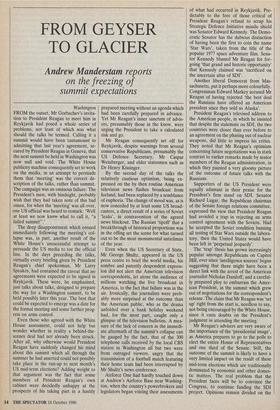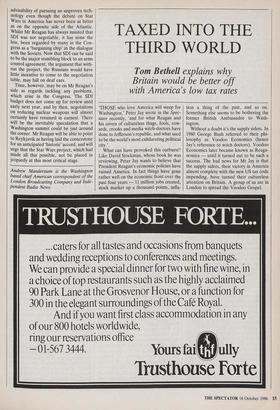FROM GEYSER TO GLACIER
Andrew Manderstam reports
on the freezing of summit expectations
Washington FROM the outset, Mr Gorbachev's invita- tion to President Reagan to meet him in Reykjavik had posed a whole series of problems, not least of which was what should the talks be termed. Calling it a summit would have been tantamount to admitting that last year's agreement, se- cured by President Reagan in Geneva, that the next summit be held in Washington was now null and void. The White House publicity machine consequently set to work on the media, in an attempt to persuade them that 'meeting' was the correct de- scription of the talks, rather than summit. The campaign was an ominous failure. The President's men, with hindsight, probably wish that they had taken note of this bad omen, for when the 'meeting' was all over, one US official was heard to remark: 'Well at least we now know what to call it, "a failed summit".'
The deep disappointment which ensued immediately following the meeting's col- lapse was, in part, another result of the White House's unsuccessful attempt to persuade the US media to toe the official line. In the days preceding the talks, virtually every briefing given by President Reagan's chief spokesman, Mr Larry Speakes, had contained the caveat that no agreements were expected to be signed in Reykjavik. These were, he emphasised, just talks about talks, designed to prepare the way for a Washington summit, to be held possibly later this year. The best that could be expected to emerge was a date for the formal meeting and some further prog- ress on arms control.
Even those who agreed with the White House assessment, could not help but wonder, whether in reality a behind-the- scenes deal had not already been struck. After all, why otherwise would President Reagan have suddenly changed his mind about this summit which all through the summer he had asserted could not possibly take place in the run-up to next month's US mid-term elections? Adding weight to that argument was the fact that some members of President Reagan's own cabinet were decidedly unhappy at the prospects of his taking part in a hastily prepared meeting without an agenda which had been carefully prepared in advance. Yet Mr Reagan's inner sanctum of advis- ers, presumably those in the know, were urging the President to take a calculated risk and go.
Mr Reagan consequently set off for Reykjavik, despite warnings from several conservative Republicans, presumably the US Defence Secretary, Mr Caspar Weinberger, and elder statesmen such as Dr Henry Kissinger.
By the second day of the talks the relatively cautious optimism, being ex- pressed on the by then routine American television news flashes broadcast from Iceland, had been replaced by a semblance of euphoria. The change of mood was, as is now conceded by at least some US broad- casters, a direct result of a series of Soviet 'leaks', in contravention of the agreed news blackout. The Russian lipoff that a breakthrough of historical proportions was in the offing set the scene for what turned out to be the most monumental anticlimax of the year.
Even when the US Secretary of State, Mr George Shultz, appeared in the US press centre to brief the world media, his sombre and patently despondent express- ion did not alert the American television correspondents, let alone the audience of millions watching the live broadcast in America, to the fact that failure was in the air. Ironically, the journalists were prob- ably more surprised at the outcome than the American public, who as the drama unfolded over a bank holiday weekend had, for the most part, caught only a glimpse of the television bulletins. A mea- sure of the lack of concern in the immedi- ate aftermath of the summit's collapse can be gauged by the fact, that of the 300 telephone calls received by the local CBS station in Washington all but two were from outraged viewers, angry that the transmission of a football match featuring their home team had been interrupted by Mr Shultz's news conference.
Airforce One had hardly touched down at Andrew's Airforce Base near Washing- ton, when the country's powerbrokers and legislators began voicing their assessments of what had occurred in Reykjavik. Pre- dictably to the fore of those critical of President Reagan's refusal to scrap his Strategic Defence Initiative missile shield was Senator Edward Kennedy. The Demo- cratic Senator has the dubious distinction of having been the first to coin the name 'Star Wars', taken from the title of the popular 1977 space' adventure film. Sena- tor Kennedy blamed Mr Reagan for for- going 'that grand and historic opportunity' that Kennedy claimed was 'sacrificed on the uncertain altar of SDI'.
Another liberal Democrat from Mas- sachusetts, put it perhaps more colourfully. Congressman Edward Markey accused Mr Reagan of having rejected 'the best deal the Russians have offered an American president since they sold us Alaska'.
President Reagan's televised address to the American people, in which he insisted that despite the stalemate on SDI, the two countries were closer than ever before to an agreement on the phasing out of nuclear weapons, did little to impress his critics. They noted that Mr Reagan's optimism concerning future negotiations was in stark contrast to earlier remarks made by senior members of the Reagan administration, in which they painted a very gloomy picture of the outcome of future talks with the Russians.
Supporters of the US President were equally adamant in their praise for the President's firm stand on SDI. Senator Richard Lugar, the Republican chairman of the Senate foreign relations committee, expressed the view that President Reagan had avoided a trap in rejecting an arms control agreement with the Soviets. Had he accepted the Soviet condition banning all testing of Star Wars outside the labora- tory, then the United States would have been left in 'perpetual jeopardy'.
The 'trap' thesis has grown increasingly popular amongst Republicans on Capitol Hill, ever since 'intelligence sources' began suggesting that there might have been a direct link with the arrest of the American journalist Nicholas Daniloff, and a careful- ly prepared ploy to embarrass the Amer- ican President, in the summit which grew out of negotiations for the correspondent's release. The claim that Mr Reagan was 'set up' right from the start is, needless to say, not being encouraged by the White House, since it casts doubts on the President's judgment in attending the meeting.
Mr Reagan's advisers are very aware of the importance of the 'presidential image', as America prepares to go to the polls to elect the entire House of Representatives and one third of the Senate. Still, the outcome of the summit is likely to have a very limited impact on the result of these mid-term elections which are traditionally dominated by economic and other domes- tic matters. The real problem that the President faces will be to convince the Congress, to continue funding the SDI project. Opinions remain divided on the advisability of pursuing an unproven tech- nology even though the debate on Star Wars in America has never been as bitter as on the opposite side of the Atlantic. Whilst Mr Reagan has always insisted that SDI was not negotiable, it has none the less, been regarded by many in the Con- gress as a 'bargaining chip' in the dialogue with the Soviets. Now that SDI can be said to be the major stumbling block to an arms control agreement, the argument that with- out the project, the Russians would have little incentive to come to the negotiation table, may fall on deaf ears.
Time, however, may be on Mr Reagan's side as regards tackling any problems, which arise in the Congress, The SDI budget does not come up for review until early next year, and by then, negotaitons on reducing nuclear weapons will almost certainly have resumed in earnest. There will be the inevitable speculation that a Washington summit could be just around the corner. Mr Reagan will be able to point to Reykjavik as having laid the cornerstone for an anticipated 'historic' accord, and will urge that the Star Wars project, which had made all this possible, not be placed in Jeopardy at this most critical stage.
Andrew Manderstam is the Washington based chief American correspondent of the London Broadcasting Company and Inde- pendent Radio News.



















































 Previous page
Previous page